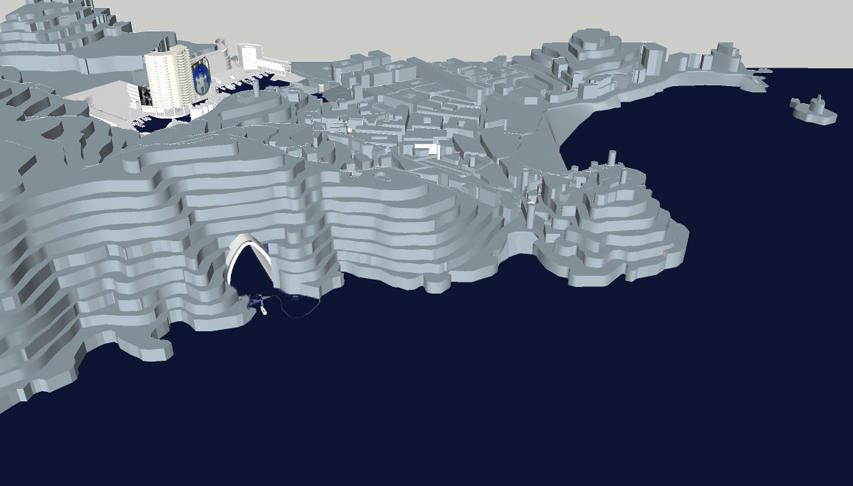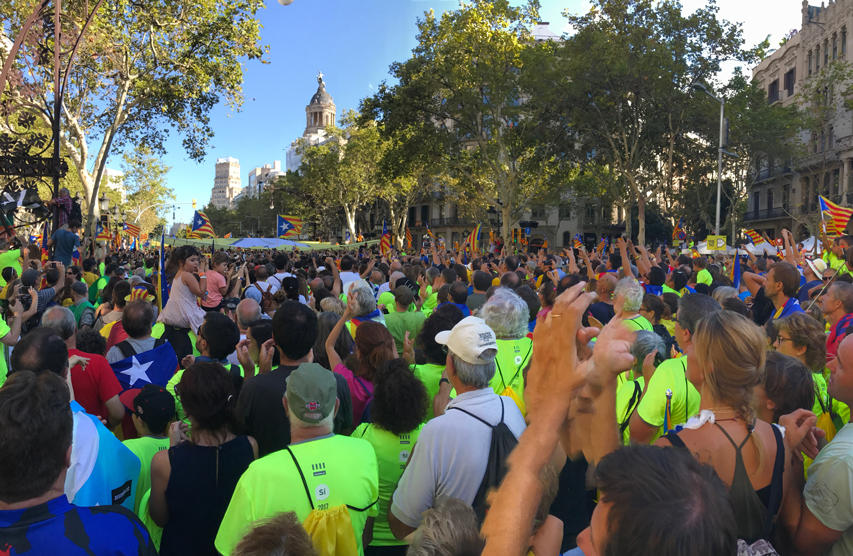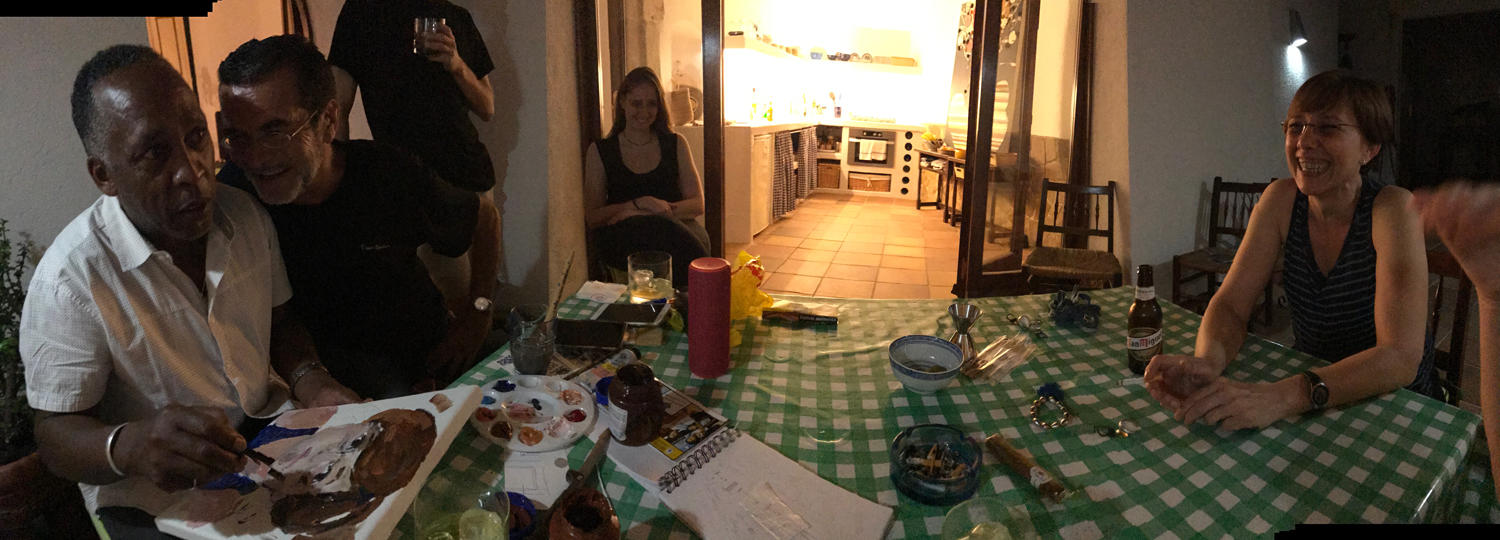September 17, 2017
Scalped

Due to a malfunction of a titanium white pigment (manufacturer: Daler Rowney Georgian), I have had to fix some paintings over recent years. The problem is not consistent, some paintings from the same year go bad and some age fine. And what is "going bad"? The oil refuses to coagulate and separates from the pigment, forming what I call "tears" after 5-8 years of welling up in a glisten.
When the painting is in my possession, I have solved the problem by accepting it, invoking the Duchampian-Broken-Large-Glass protocol. Japanese wabi-sabi. Kintsugi. Inspired by the little cups attached to the bottom of Spanish jamon, used to catch drippings of fat, I fashioned little cups of my own and suspended them with wire from the bottom of the affected paintings. Here's a recent example. I think they look fabulous. (Click here to see what I am seeing in the image above.) Too bad that I haven't been able to convince my collectors of this fix so far. I understand that they want the painting that they paid for in the first place.
But, c'mon people! ;-)
When a collector calls my attention to the problem, I do everything I can to fix it. Mostly, it has been easy. I dry the tears with Q-Tips and cotton swabs. I use as little solvent as possible. I then remove the bad paint and replace it entirely with a new formulation composed of a walnut oil based titanium white, which dries whiter and is seemingly free of this problem. I've been testing this method for five years now with good results. But when the problematic white is in the foundation of the painting, I have to get drastic. I tear the canvas off and repaint a new identical painting. A scalping. The Shroud of Turin. I've done this about five times so far, and nearly always, the painting scalped becomes fabulous to my eye. Hallucinatory. The kind of shredded distress that I have been trying to evoke in recent work happens naturally in the scalped canvases.
The question is how to take this inspiration and go forward with it. The problem is that these paintings are well dried. They "begin" with an aged history of being stretched to panels. They are usually glued to the panels, requiring me to wrestle them off of them with brute force. This leaves marks and effects that are impossible and futile to pull off de novo. You can't fake these things.
I'm still dwelling on this challenge.
Please stay tuned.
Postscript:
Here is the original painting above, pre-scalping. Title here. I have numbered the scalped painting #545, same title.
Below the fold, the repainted gemelo...

Moving with the Mind A Wander
ww#307
91x76 cm
Port of Tossa de Mar
Last year, Tossa was presented with a plan to build a port. The locals didn't like it, and counter propaganda was unleashed, warning of the reckless plunder of the coastline. It described the port as bait, a distraction concealing a nearby architectural project overlooking the sea, now under construction.
Tossa de Mar was once a fishing village and now a tourist destination, a small pueblo situated at the bottom of the craggy Costa Brava, almost exactly between Barcelona and the French Border, merging the Pyrenees with the Mediterranean Sea. A marvel of countless coves and tiny inlets, the forested mountainous region has slowed development to the advantage of its bountiful natural beauty. The plan involved a tunnel punched through the craggy coastline from Tossa's central bus station. Vehicle traffic would then connect to a standard L-shaped breakwater, piers and service structures at the shoreline.
A significant amount of the coast would have to be modified -defaced- in order for this to happen. I thought about alternatives to this and few other locations along the coastline avoided the identical set of problems. But what if they flipped the plan? What if instead of bringing auto and truck traffic to the water, they instead brought the ships inland via the tunnel they were already willing to contemplate?
I checked out the topological maps and plotted the site for an interior harbor. It could be behind the existing bus terminal, the heart of the town. Behind it, a small semi level valley could be modified, nestling the project into unused land (currently parking lots, a few homes, farmland gone fallow and little else besides this). The tunnel would need a canal/lock system to raise water traffic to the level of the interior harbor. Once inland, all of the infrastructure needed for the port could be arrayed around it and an assortment of mixed urban programs (shopping, hotels, apartments, civic functions, etc.) could frame the harbor.
And the coastline cold be kept intact, save a small entrance tucked into the crags behind Tossa's Codolar Cove.

September 16, 2017
9-11 Catalá

(Last week in Barcelona.)
I take no position pro or con concerning the current dispute between Spain and Catalunya. What I will present in this post -facts to a candid world- will be intentionally equivocal because the issues involved are multifaceted, ambiguous, intractable, and genuinely ambivalent.
This coming first of October, Catalunya will hold another vote for independence, one they promise to be decisive. After a summer in the Costa Brava, I have seen a lot of excitement, more that ever during the last 17 years of yearly visits to Spain. In order to tell this story, a little bit of context is in order.
The long history of Catalunya, in a capsule:
For millennia, waves of civilizational settlement surged and ebbed, gradually forming the cultural identity of Catalunya. Starting as early as the Phoenicians and Carthaginians and arriving at the formation of a distinct language after six centuries of Roman rule, via the influence of a popular street Latin (compared to the formation of Castilian from a court Latin), Catalunya emerged fully formed as a regional power with the beginnings of the Reconquista and the expulsion of Muslim occupation in that region in 801 A.D. Take note that even at this moment of inception, Catalan identity was subsumed within the composite monarchy of the Kingdom of Aragon which included Aragon, Barcelona and Valencia. I can't do better than Wikipedia to describe what happens next: "The marriage of Isabella I of Castile and Ferdinand II of Aragón and the conquest of the last Muslim kingdom of Granada in 1492 tied Catalonia politically to the fate of the new Spanish kingdom. Even so, a regional culture continued to survive and thrive."
"Even so...", these words could be the story of Catalunya's life. The overarching story is that Catalan identity has always been subsumed and frustrated within the struggles of other, larger competing political identities. It was the War of the Spanish Succession that etched this story as a tragedy with the siege of Barcelona in the Catalan mind. A couple of years ago, I had read Albert Sánchez Piñol's "Victus, the Fall of Barcelona" at the encouragement of my ardent Catalan independista friends. Bear in mind that 9-11 in Catalunya is the anniversary of the capitulation of Barcelona to the siege on September 11, 1714... an insult to self determination commemorated to this day with massive street manifestations. The struggle to be more than a pawn within larger power struggles collapsed with the Treaty of Utrecht in 1713 when Great Britain betrayed their Catalan alliance by trading them as a vassal to Spain in exchange for Gibraltar.
What followed in chain was the French Revolution, the ensuing Napoleonic Wars and an endlessly recurring struggle between those who want Liberal Republics and those who want Conservative legacy (Monarchy), between the people and the cognoscenti, between innovation and tradition, between tomorrow and the past. The list of disasters are too many to detail concisely here, forcing us to fast forward to the inception of concrete Catalan political separatism in 1920's which had achieved a flickering victory with political autonomy until Franco in 1938. In the subsequent 37 years of fascist rule, Franco attempted to erase Catalan culture by banning the language, cultural expression and diluting the region with population flows from other parts of Spain.
After Franco, a constitutional republic was reestablished that simultaneously recognized the various regional autonomies and and territorial integrity specifically using the terms "...indissoluble unity of the Spanish Nation and the common and indivisible homeland of all Spaniards...". When the terms of autonomy were applied variously between the different regions (and much could be written about this, but I am trying to be concise here), the desire for separation arose with increasing force with multiple referendums, alternating with multiple court decrees declaring them constitutionally invalid in train.
And this is where we are now.
The provocation of a civil war is a grave act. PEOPLE WILL DIE. It pushes a state into an existential crisis, compelling it to use its specific license for violence in order to maintain its sovereign integrity. Catalunya has its own existential crisis, one that has simmered for over 300 years. This is the crisis of coming into existence, the yearning to be born. Can it continue to live, smoldering, one identity wrapped within a bundle of others? My Catalan friends say "No!", they are drowning culturally and their desire to breathe free as a Catalan has the same urgency as the sensation given by asphyxiation. My Spanish friends scoff at this, saying that they can be as Catalan as they want, nobody is suffocating them. Their birth is not frustrated, they already exist, unfettered. But shouldn't they address the paradox at the core of their constitution, recasting the terms of autonomy justly and redefining unity in terms less... binding?
When I mention Thomas Hobbs and Max Weber's concept that the state has the legitimate monopoly of violence and then ask if they are willing to use violence to win/defend their independence even at the risk of being subjected to the right and responsibility of Spain to enforce their own monopoly. Their response is interesting. Either they stare at me in disbelief, or they say something remarkable. Their stares tells me that they haven't yet factored the consequence of having to bear arms. Indeed, they don't think that they will have to. One old sage told me, "We will take flowers to their guns at the border!" It seems that their strategy is to shame their adversary in the eyes of the world as a fascist scumbag. In this case, Madrid's only recourse would be a charm offensive, a skill they have yet to perfect. My mind drifts into a lazy daydream about a civil war of seductive attack and seductive counterattack.
Daydreams aside, what if Madrid really does send tanks to the border? Sovereignty demands self protection, a prime directive. Is the crisis of such a degree that the risk of bloodshed and the loss of human life really is worth the price? Remember that the Spanish Civil War proved that the spaniards -or Iberians- have a great capacity to be bloody minded. The estimates of those who were summarily executed and buried in roadside ditches range from the high four to six figures. And it's not like they have forgotten this pain, on several occasions, I have been told of how horrible it was that the war was not about village against village but brother and sister against brother against sister... but then I have heard elsewhere of the idea that the sign of intelligence is the ability to hold two contradictory ideas in ones' head at the same time. But, intelligence and wisdom are not the same.
Even more strangely, when I ask about border controls should their bid for independence succeed, I don't get the sense that much has been publicized about the this and other administrative technicalities that will have to be disentangled or created outright. Public pensions? Membership in the EU? And why would they want to be a member of the EU? Currency? What are the protocols and administrative machinery for engineering this change? And wouldn't Brussels only turn into another Madrid for Catalunya? What about the new constitution? Has anyone written a draft? Who is on the committee? What is the conceptual basis for a Catalan State? A couple of friends talked about retaining their Spanish passports after independence is won. How will this work? How can you say the constitution is invalid and valid at the same time? Isn't there something.. quixotic about this quest? I am still searching for answers to these questions.
Do Catalans have a responsibility towards consanguinity for the sake of an Iberian solidarity? My Catalan friends dismiss this outright. One recurrent complaint is how their tax money is misspent in the poorer provinces, depriving Catalunya of the developmental funds that they deserve. "They have freeways, we have toll roads." I ask, "What about socialism?" All I get in response is a shrug or worse, they reply with the classic "...va por culo..." -they can "...blow it out their ass". Perhaps a constitutional reform is the cure? Perhaps a federal arrangement is better, altering the current system where all tax money goes first to Madrid and then to the autonomous regions, provoking so much heartburn? "It's too late for that", they reply dismissively. "But, but..." I usually stutter, "...don't the other regions of Spain have their own complex histories, identities, even distinct languages?"
Still, I scratch at their European socialism. One remarkable response is that they too in other parts of Spain are watching, waiting for their own opportunity. What I find extraordinary about this is that the motivating idea was the effort to end war between nation-states was with the formation of the superstate of the European Union. It won't be possible to see this through until the EU moves past a financial union into a political union. Only then would the individual nation-state be superfluous, dissolve and a multitude of regions bloom into individual autonomies. When I truck this thought out to my Spanish/Catalan friends, they usually sniff that that would never happen. Germany, France or Spain would never cease to be. Well, if that's true, I replied, why would Spain let you be?
I feel for my friends in Spain and Catalunya. Currently, vote estimates from various sources come down to 50-50 pro and con. Similarly, the opinions of my friends are split down the middle too. The ones who want the vote are quite vocal, the ones critical are conspicuously silent. Sometimes, the critics express themselves in hushed tones, out of earshot of the others. Furtive. They think this is a self inflicted wound. Unnecessary pain. I empathize with both sides. I hope that they can overcome their alienation. I hope that Madrid mounts a charm offensive, more carrots than sticks. I hope that the leaders of Catalunya can take their people to a place we all can be proud of.
My recommendation is for a constitutional convention that recreates the Spanish Republic in a way suitable to everyone within it. But who am I? A mere dominguerro Yanqui with our own set of challenges.
September 13, 2017
That Little Sob in the Spine

Link:
Since my youth -- I was 19 when I left Russia -- my political creed has remained as bleak and changeless as an old gray rock. It is classical to the point of triteness. Freedom of speech, freedom of thought, freedom of art. The social or economic structure of the ideal state is of little concern to me. My desires are modest. Portraits of the head of the government should not exceed a postage stamp in size. No torture and no executions.
Cups and Tears and Milk

It's time to:
1. Catch the fat.
2. Dry the tears.
3. Shake up the studio.
4. Catch up my friends.
5. Shift gears.
6. Process the jet lag.
7. Digest a summer just past.
8. Lactate lagrimas.
9. "Don't cry, don't cry..."
10. Resonate more.
11.


